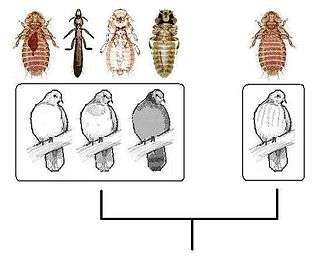Eichler's rule

When comparing host sister clades we tend to find taxonomically richer parasite fauna on the taxonomically richer group of hosts.
Parasites tend to be highly specific to their hosts, thus it seems reasonable to expect a positive co-variation between the taxonomic richness of hosts and that of their parasites. Wolfdietrich Eichler[1] was the first to point out this relationship in 1942 and it was later dubbed ‘Eichler’s rule’. It is one of the first three coevolutionary rules.[2]
Recently, Vas and his co-authors[3] tested this 'rule' and concluded that exceptionally strong correlational evidence supports the positive co-variation between the species' richness of avian and mammalian families and the generic richness of their parasitic lice.
References
- ↑ Eichler, W (1942). "Die Entfaltungsregel und andere Gesetzmäßigkeiten in den parasitogenetischen Beziehungen der Mallophagen und anderer ständiger Parasiten zu ihren Wirten" (PDF). Zoologischer Anzeiger. 136: 77–83.
- ↑ Klassen, GJ (1992). "Coevolution: a history of the macroevolutionary approach to studying host-parasite associations". Journal of Parasitology. 78 (4): 573–87. doi:10.2307/3283532. PMID 1635016.
- ↑ Vas, Z; Csorba G; Rozsa L (2012). "Evolutionary co-variation of host and parasite diversity – the first test of Eichler's rule using parasitic lice (Insecta: Phthiraptera)" (PDF). Parasitology Research. 111: 393–401. doi:10.1007/s00436-012-2850-9.
This article is issued from Wikipedia - version of the 3/7/2016. The text is available under the Creative Commons Attribution/Share Alike but additional terms may apply for the media files.